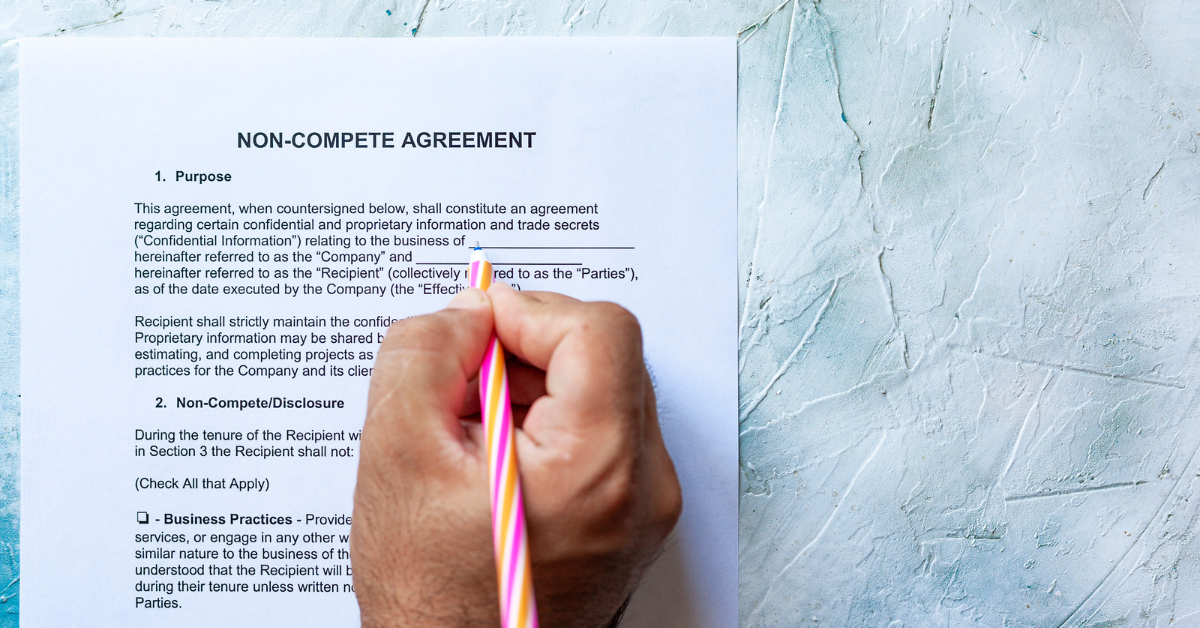What Is a Non Compete Agreement?
Non-compete agreements are established to protect business interests from being shared publicly or with competitors. Trade secrets, client data, and business finances are all common areas covered under a non-compete agreement to protect precious internal information from being shared with outside sources by employees.

Are Non Compete Agreements Legal?
In the state of Massachusetts, non-compete agreements are legal ways to protect business information from being shared. However, some businesses use noncompete clauses to restrict where and with whom employees can do business with when outside of work. In a recent proposal, the Federal Trade Commission proposed to ban employers from using non-compete agreements on their workers in a way that would prevent them from further opportunities to expand their career.
There are plenty of benefits for businesses to use non-compete agreements. For example, if an employee leaves the company and attempts to seek a job at a competing business, a non-compete can prohibit that employee from sharing trade secrets and business plans from their previous employer. However, when non-competes are used maliciously, they restrict employees from being able to supplement their income with side jobs and can prevent them from starting new businesses. The new proposal from the FTC aims to eliminate non-competes that show bad intent towards the success of employees.
Are Non Compete Agreements Enforceable?
Non compete agreements in Massachusetts are enforceable when they protect legitimate business information and interests. In alignment with the FTC’s proposed ban, non-compete agreements in Massachusetts cannot be used to deprive employees of opportunities to use their skills outside of the workplace.
Non-compete agreements must be mutually agreed upon by the employer and employee. Certain professions cannot use non-compete agreements including lawyers, physicians, social workers, and nurses.
Are Non Compete Agreements Enforceable Against Independent Contractors?
In the state of Massachusetts, non-compete agreements can be used for independent contractors according to the Massachusetts Non Compete Act. Independent contractors must be legally considered as independent contractors under Massachusetts state law when signing the non-compete agreement in order for it to be upheld. Cases in which an employer accuses an independent contractor of breaking a non-compete agreement will not be upheld if the employee is not defined as an independent contractor under Massachusetts law.
How to Get Out of A Non Compete Agreement
If you are stuck in a non-compete agreement that you do not agree with, it is best to contact an employment lawyer as soon as possible to discuss possible legal actions you can take. In order for a non-compete agreement to be considered invalid, you must provide that the agreement does not support or relate to legitimate business interests of the company. Massachusetts only enforces non-compete agreements that protect legitimate business interests, such as trade secrets.
Can Lawyers Sign Non Compete Agreements
A lawyer can help you walk through a non-compete agreement to help you understand what you are agreeing to. However, you will have to agree with your employer for the non-compete agreement to be valid and will have to personally sign.
Non-compete agreements are not allowed in certain professions, including for lawyers. A lawyer can sign a non-compete agreement for their company, but it is not enforceable under Massachusetts law.
Non-Compete Agreement vs. Non-Disclosure Agreement
Non-compete agreements and non-disclosure agreements are confidentiality contracts protecting business interests of the employer. However, non-compete agreements further asset that employees cannot compete with their current (or former) employer.
Non-disclosure agreements are used to protect sensitive information shared with employees over the course of their employment. It helps protect vital company information and data from being shared with competitors or released publicly.
Non-compete agreements can be standalone agreements or part of a larger employment agreement. They are often proposed at the start of employment that covers the entire reign of the employee’s employment at the company. Non-disclosures can be proposed at any time during the employee’s employment, as they tend to focus on prohibiting specific vital information from being shared elsewhere.
If you are concerned about a non-compete agreement that has either been proposed or already signed, it is best to consult directly with an employment lawyer as soon as possible. An employment lawyer has experience handling non-compete agreements and can assess your unique case for the best legal advice on how to move forward.
Disclaimer
The information contained in this blog is for general information purposes only. Bonville & Howard assumes no responsibility for errors or omissions in the contents of the blog.
In no event shall Bonville & Howard be liable for any special, direct, indirect, consequential, or incidental damages or any damages whatsoever, whether in an action of contract, negligence, or other tort, arising out of or in connection with the use of this blog or the contents of this blog. Bonville & Howard reserves the right to make additions, deletions, or modifications to the contents of this blog at any time without prior notice.
